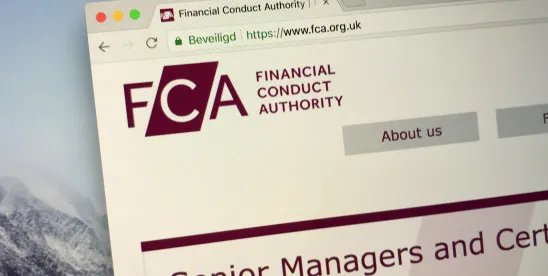Background
In the United Kingdom, prior approval must be obtained from the Financial Conduct Authority (the “FCA”) or the Prudential Regulation Authority (the “PRA”) prior to becoming a “controller” of an FCA or PRA authorised firm (an “Authorised Firm”).
Such approval is obtained via a “change in control” filing that is submitted to the FCA or PRA (depending on the competent authority of the Authorised Firm) prior to the acquisition of:
- 10% or more of the shares / voting power in an Authorised Firm or its parent; or
- shares / voting power in an Authorised Firm or its parent, as a result of which the acquirer is able to exercise “significant influence” over the management of the Authorised Firm.
There are also certain circumstances that could affect this 10% threshold:
- for “non-directive” firms (i.e. non-MiFID investment firms, general insurance intermediaries, consumer credit firms and home finance firms) the shares / voting power threshold is 20% or more; and
- for “limited permission consumer credit” firms, the shares / voting power threshold is 33% or more.
New Guidance
On 1 November 2024, the FCA and PRA published a joint policy statement (FG24/5) setting out new guidance for assessing change in control applications (the “Guidance”). Effective from the date of publication, the Guidance replaces the EU guidelines that the FCA and PRA previously referred to (including post-Brexit).
Overall, the Guidance does not introduce any significant change to how the change in control regime is currently applied in the UK but rather reflects a continuation of the approach adopted to date, with clarifications in certain areas.
Although new change in control forms have been published here, these only contain minor changes (e.g. to refer to the Guidance) and do not include any new questions.
Key Points
The key points of relevance for transactions involving Authorised Firms are:
Controller Analysis
- Decision to acquire: The Guidance sets out a non-exhaustive list of factors that could influence whether proposed controllers have made a “decision to acquire” (and, as such, whether a controller form is required to be submitted) – including whether the controller is “aware of” or has the “ability to influence” the transaction. These factors could, for example, be used to explain to the FCA / PRA that limited partner investors in funds have not made a decision to acquire control of an Authorised Firm. Whilst the FCA / PRA have historically accepted such an argument, they still ask for some basic details on the investors. It is expected that this approach will continue going forward.
- Significant influence: The Guidance sets out a non-exhaustive list of factors that could influence whether an entity could be deemed a controller of an Authorised Firm via “significant influence” (rather than the usual shares / voting power tests) – including the ability to direct or influence decisions made by the board of the firm / its parent, the ability to appoint or remove a member of the firm’s board, and/or veto power over “material matters” relating to the firm (e.g. changes to its business plan or strategy).
Note: When considering whether an entity could be deemed a controller of an Authorised Firm via “significant influence”, it should be noted that the Financial Services and Markets Acts 2000 (“FSMA”) remains unchanged and so a person still needs to hold at least some shares / voting power in the Authorised Firm or its parent, in order for an entity to be deemed a controller via “significant influence”. - Acting in concert: The Guidance provides information on when the shares / voting power held by multiple entities should be aggregated. This may come up, for example, in the context of funds with shared general partners, managers and/or upstream holding structures. The Guidance reflects the approach the FCA / PRA have historically taken when determining whether proposed controllers are “acting in concert”.
Potential Follow-up Questions from the FCA / PRA
- Debt financing: The Guidance states that the FCA / PRA may ask for additional information where the acquisition involves substantial debt financing, in order to be “satisfied as to the financial soundness of the acquisition and the potential impact on the UK authorised [firm]”. Examples provided in the Guidance of such requests include: copies of external and internal debt / loan agreements, evidence to support ability to repay the debt / loan including any dividend upstreaming, debt / loan repayment profile, and liquidation ratios / projections.
- Private equity ownership: The Guidance states that the FCA / PRA may ask for additional information where the acquisition involves private equity ownership. Examples provided in the Guidance of such requests include: details of the performance of past investments in financial institutions, details of the proposed controller’s investment policy / decision-making framework, and details on the proposed controller’s anti-money laundering framework (where the proposed controller is not authorised by the FCA / PRA itself).
Other Points
- Financial soundness: The FCA / PRA will consider “financial soundness” as part of their assessment of the proposed controller. The Guidance notes that the FCA / PRA expect to consider the capacity of the proposed controller to finance the proposed acquisition and to maintain, for the foreseeable future (usually three years), a sound financial structure in respect of the proposed controller and of the Authorised Firm. If the FCA / PRA consider, based on their analysis of the information received, that the proposed controller is likely to face financial difficulties during the acquisition process or in the foreseeable future, the FCA / PRA may reject the change in control application and object to the acquisition.
- Integrity assessments: The FCA / PRA will consider any criminal or administrative records as part of its assessment. Unlike other jurisdictions, criminal background checks are not required to be submitted to the FCA / PRA (and this remains unchanged in the Guidance).
- Board composition / senior manager appointments: Where possible, the appropriate Senior Management Function (“SMF”) application (for e.g. changes to the Authorised Firm’s board arising from the proposed change in control) should be submitted at the same time, or shortly after, the change in control notification is submitted. Given the Authorised Firm is required to submit the SMF filing, the FCA / PRA recognises that submission at the same time as the change in control filing may not be possible. In such circumstances, the FCA / PRA may request draft SMF applications to assist with its assessment.
- Conditional SPAs: As was previously the case, SPAs that require FCA / PRA approval prior to completion can be entered into without FCA / PRA approval beforehand. In circumstances where control is acquired at the time the agreement is entered into, prior FCA / PRA approval would be required (although, in practice, such circumstances may be rare).
- Review Timeline: The FCA / PRA will consider a change in control filing as “complete” when it includes all required information for the FCA / PRA’s assessment to commence and, once marked “complete”, the FCA / PRA have up to 60 working days to assess the filing. The FCA / PRA have confirmed in the Guidance that:
- notifications received after 16:00 will be deemed as being received the following working day and the day of receipt is day “zero”;
- information provided as part of the notification may subsequently be assessed to be incomplete (for example, if new information comes to light or there are amendments to the proposed acquisition);
- for complete notifications, the FCA / PRA must inform the notice giver of the completeness of the notification within two working days; and
- for incomplete notifications, the FCA / PRA must inform the notice giver of the incompleteness of the notification as soon as reasonably practicable. The FCA / PRA also endeavor to acknowledge the incomplete notification in writing before the end of the second working day and to confirm the missing information in writing within 10 working days.
Next Steps
Market participants seeking to acquire Authorised Firms should familiarise themselves with the Guidance.





 />i
/>i

